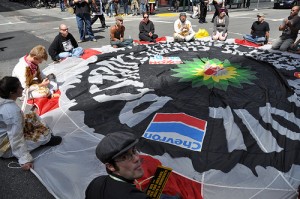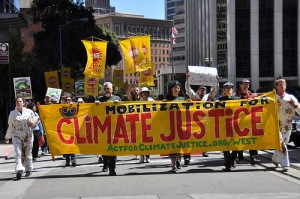 Great action today in San Francisco.
Great action today in San Francisco.
The Mobilization for Climate Justice West (MCJ-West) turned out 150 people on a Monday afternoon and marched to the SF financial district offices of Chevron, the Environmental Protection Agency and BP calling for Big Oil to stop harming our environment and communities and pay up for the damage they’ve caused.
A coalition of national, regional and local groups, activists with MCJ-West) blockaded the doors of the SF BP offices and the intersection in front of the building.
With a set of demands, MCJ-West organized one of the largest direct actions at BP to date with 15 arrested.
MCJ-West’s demands include:
* Moratorium on New Offshore Drilling. No Use of Dispersants. Full Access to Media and Civil Society.
* Big Oil corporations pay their debt to all impacted communities – Gulf Coast to Richmond, CA and around the world.
* Big Oil pay for community livelihood and ecosystem restoration, clean energy, public transportation, and healthcare for impacted communities.
* Big Oil Out of Politics!
Activists also delivered a letter from it’s coalition to BP.
Here’s the letter:
 To: CEO’s of British Petroleum, Chevron, Shell, ConocoPhillips, ExxonMobil, Tesoro, and Valero
To: CEO’s of British Petroleum, Chevron, Shell, ConocoPhillips, ExxonMobil, Tesoro, and Valero
August 30, 2010
In the wake of the recent BP disaster, we are writing to express our concern over the oil industry’s continued disregard for the health of communities and ecosystems around the world. Mobilization for Climate Justice West is a coalition of organizations, some of which represent communities directly impacted by the oil industry’s extraction and refining operations; we are dedicated to promoting effective and just solutions to the climate crisis.
We call on the oil industry to accept responsibility for the damages your operations have caused worldwide and specifically to:
1. End the use of dispersants in cleaning up oil spills. Dispersants, such as the Corexit used in the BP disaster, are toxic chemicals whose long-term impact on ocean life is unknown. Using dispersants allows for better public relations for the oil industry since they make the oil less visible, while possibly making the long-term impact of spills even worse.
2. Grant full access to media and civil society in covering oil spills. During the BP disaster, there have been many complaints from journalists that BP restricted their access and ability to gain information. In July, the Society of Professional Journalists issued an open letter expressing their concerns over restrictions of press access to beaches and other sites in the Gulf.
3. Pay your debt to the communities that have been impacted by your operations. In the Gulf Coast, the oil spill has destroyed the livelihoods of many fishing and oystering communities. Communities are also impacted by oil extraction and refining in places like Nigeria, where an Exxon Valdez-sized spill has occurred every year since 1960; in Alberta, Canada where First Nations indigenous communities are experiencing abnormally high rates of cancer and a destruction of their traditional ways of life due to extreme water pollution from upstream tar sands operations; and in refining communities like Richmond, California where more than 25,000 people live within 3 miles of the refinery and the community suffers from high levels of asthma and other respiratory diseases. The oil industry must pay for the the restoration of ecosystems and community livelihoods, for the development of clean energy and public transportation solutions, and for healthcare to treat those whose health has been impacted by your pollution.
4. Stop funding fake “astro-turf” rallies. Last year the American Petroleum Institute, of which British Petroleum, Chevron, Shell, ConocoPhillips, and ExxonMobil are members, launched a fake grassroots campaign called “Energy Citizen” and bussed employees to lobbyist-organized rallies to oppose climate legislation that might limit climate pollution. Shell, publicly stated last year that it would not participate in “Energy Citizen” rallies. Now API is up to it again with a series of fake rallies to oppose removing billions in oil company tax breaks and opposing limits on offshore drilling. Will you join Shell’s pledge not to participate in what have been called “glorified company picnics”?
5. Stop lobbying against solutions to climate change and against regulations to protect our communities. Instead of using its profits to re-pay the debt to communities impacted by its operations, the oil industry funnels billions into lobbying to ensure that it will not be held responsible for its pollution. During the BP disaster, from April-June, 2010, the American Petroleum Institute spent $2.3 million on lobbying. According to the Washington Post, three fourths of all oil and gas lobbyists used to work for the federal government; the poor regulatory oversight of deepwater drilling is one result of this revolving door. The oil industry also lobbies against solutions to climate change; members of the House Energy and Commerce Committee who voted against the Waxman-Markey climate bill in 2009 received almost 3 times more in contributions from carbon-intensive industries than members who voted in favor of the legislation. In California, Tesoro and Valero are funding Proposition 23 on this November’s ballot to derail the implementation of California’s climate change legislation.
Sincerely,
Mobilization for Climate Justice West, Richmond Progressive Alliance, Communities for a Better Environment, Global Exchange, Greenpeace, Rainforest Action Network, West County Toxics Coalition, Gulf Restoration Network